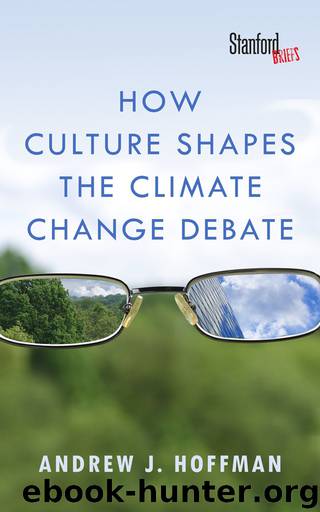How Culture Shapes the Climate Change Debate by Hoffman Andrew J

Author:Hoffman, Andrew J. [Hoffman, Andrew J.]
Language: eng
Format: epub
Publisher: Stanford University Press
Published: 2015-03-11T04:00:00+00:00
5
HISTORICAL ANALOGIES FOR CULTURAL CHANGE
Human history becomes more and more a race between education and catastrophe.
—H. G. Wells
Consider the central cultural question of climate change: Do you believe that we, as a species, have grown to such numbers and our technology to such power that we can alter the global climate? 1 If you answer this question in the affirmative, then a series of related cultural challenges emerges. Climate change represents a deep shift in the way we view ourselves, the environment, and our place within it. It is the ultimate “commons problem,” where every individual has an incentive to emit greenhouses gases to improve their standard of living, while the costs of this activity are diffused among many. Addressing this problem will require the most complicated and intrusive global agreement ever negotiated. 2 It will also require a shift in our sense of global ethics around collective responsibility. The fossil fuels burned in Ann Arbor, Shanghai, or Moscow have an equal impact on the global environment we all share. The kind of cooperation necessary to solve this problem is far beyond anything that our species has ever before accomplished. International treaties to ban land mines or eliminate ozone-depleting substances pale in comparison .
To some the challenge seems too great. But history is replete with examples of our culture changing in equally radical ways. Thus far the focus of this book has been on the contributions of social science to the climate change debate. While the social sciences can help us understand the biases and heuristics that lead people to accept or reject the scientific basis of climate change, the humanities—and history in particular—can help us understand the issue on a more personal level. Indeed, research shows that we will not act on the issue unless it evokes strong visceral reactions. 3
To explore this notion, let us consider two historical analogies. The first is the debate over cigarette smoking and cancer, which highlights the difference between a scientific consensus and a social consensus and the process that leads from one to the other. The second is the debate over the abolition of slavery, exemplifying the magnitude of the cultural shift we now face with climate change and the multiple pathways for achieving it. Each analogy speaks to a deep shift in our culture, the first driven by new scientific findings, the second by changing societal mores. Each of these shifts involved intense political debate and conflict and faced strong resistance from powerful economic and political interests. As such, they have important resonance with the climate change debate we face today.
SHIFTING FROM A SCIENTIFIC CONSENSUS TO A SOCIAL CONSENSUS: CIGARETTE SMOKING AND CANCER
Scientists first began to explore a link between cigarette smoking and lung cancer in 1949. By 1956, the preponderance of epidemiological and mechanistic data pointed to a link between cigarette smoking and cancer. In 1964, the U.S. Surgeon General recommended that controls on cigarette smoking be established to protect public health. And yet it was not for four decades that such action was actually taken.
Download
This site does not store any files on its server. We only index and link to content provided by other sites. Please contact the content providers to delete copyright contents if any and email us, we'll remove relevant links or contents immediately.
The Secret History by Donna Tartt(19067)
The Social Justice Warrior Handbook by Lisa De Pasquale(12190)
Thirteen Reasons Why by Jay Asher(8900)
This Is How You Lose Her by Junot Diaz(6881)
Weapons of Math Destruction by Cathy O'Neil(6270)
Zero to One by Peter Thiel(5793)
Beartown by Fredrik Backman(5748)
The Myth of the Strong Leader by Archie Brown(5505)
The Fire Next Time by James Baldwin(5435)
How Democracies Die by Steven Levitsky & Daniel Ziblatt(5217)
Promise Me, Dad by Joe Biden(5148)
Stone's Rules by Roger Stone(5085)
A Higher Loyalty: Truth, Lies, and Leadership by James Comey(4958)
100 Deadly Skills by Clint Emerson(4922)
Rise and Kill First by Ronen Bergman(4784)
Secrecy World by Jake Bernstein(4746)
The David Icke Guide to the Global Conspiracy (and how to end it) by David Icke(4712)
The Farm by Tom Rob Smith(4505)
The Doomsday Machine by Daniel Ellsberg(4489)
